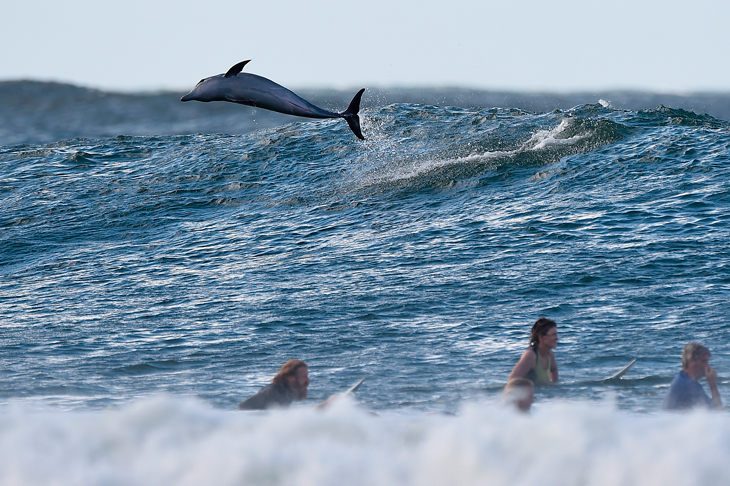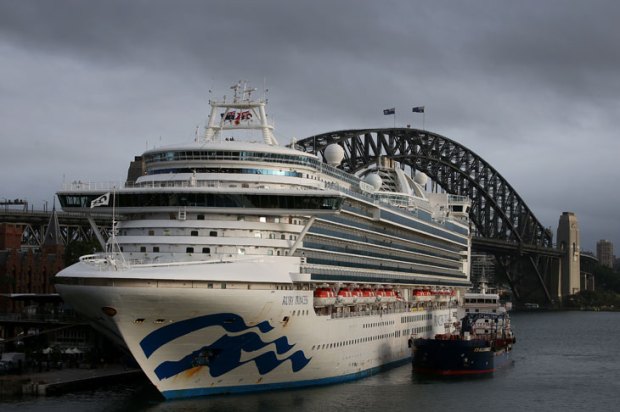Has Flipper finally flipped? After centuries of challenging dogs for the Mans’ Best Friend guernsey, an incident in New Zealand suggests that relations between humans and dolphins may be entering a worrying new phase. I came to this conclusion after reading a piece in last weekend’s Oz about a diver who spent ten minutes of last week fending off a two-metre bronze whaler in Auckland Harbour. Since the diver in question lived to tell – and tweet – the tale, you might wonder why it was even picked up by the Australian media. There are two reasons. The first is that a third species, the bottle-nosed dolphin, had a small but by no means supporting role in this drama. But rather than rush to the defence of its fellow mammal, as bottle-nosed dolphins are famously wont to do on such occasions, the one involved in this incident assumed the ineffectual watching brief of a NATO peacekeeping force. A Kiwi scientist quoted in the article suggested that such uncharacteristic reticence may have been due simply to fear. But the photo the diver’s buddy took, which accompanied his tweet, shows that the dolphin is considerably bigger than the shark. And there is something else about this photograph which invites a chillingly different interpretation. While the murkiness of the water makes it hard to discern the dolphin’s, er, facial expression, one thing you can see very clearly is that both its pectoral fins are pointing down rather than out to the side. And that, as the Kiwi scientist would have confirmed if she’d been asked, is the closest a bottle-nosed dolphin can get to folding its arms.
The story’s other notable detail is the identity of the diver, who just happens to be Clarke ‘first bloke’ Gayford, the husband of New Zealand’s recently elected and glowingly pregnant Prime Minister, Jacinda Adern. It would be nice to dismiss the dolphin’s equanimity as an aberration – that it was merely out of sorts that day, due, perhaps, to the ingestion of a dodgy sardine. But the fact that if it committed this breach of interspecies protocol with the spouse of the leader of a country with such impeccable green credentials – someone, moreover, whose most inconsequential quotidian activities are sure to attract some kind of media attention – makes me to wonder if what went down in Auckland Harbour that day was entirely happenstance. The intelligence of dolphins, after all, is proverbial. Could it be that this dolphin had not gone rogue, but is the thin end of a very frightening wedge, and that dolphins as a species are at a tipping point in their relations with us? That having given us the benefit of the doubt for centuries, so many of these fabulous creatures have now been strangled by our fishing nets, choked by our plastic bags and poisoned by our oil spills in recent years that they no longer wish to be friends with even the most environmentally responsible of us? Worse, that these clever, highly evolved mammals have set aside their long-standing differences with a prehistoric fish which is in every way their inferior in order to take on what they consider to be a common enemy. The aquatic equivalent of Israel suspending hostilities with Hamas to defeat Isis.
A dolphin shark coalition would add an unwelcome frisson to many of Australia’s traditional summer activities, and it is likely that participation in events like the Sydney Skinny – already known affectionately as ‘the world’s biggest burley’ – would decline rather dramatically. But the effects on our tourism industry could be absolutely devastating. Visitor numbers would fall so far and so quickly, in fact, that state governments would soon be forced to accede to public demands for a cull of both species. But it’s an ill wind that blows nobody any good. And the upside of that would be that dolphin meat, being extremely lean, would be promoted to eager hipsters as both an inexpensive protein source and, given its incomparably smaller carbon footprint than beef, lamb, pork and even chicken, an antidote to global warming. That, at least, is something dolphins would never hold humans responsible for, of course. They’re far too intelligent for that.
Got something to add? Join the discussion and comment below.
Get 10 issues for just $10
Subscribe to The Spectator Australia today for the next 10 magazine issues, plus full online access, for just $10.
You might disagree with half of it, but you’ll enjoy reading all of it. Try your first month for free, then just $2 a week for the remainder of your first year.















Comments
Don't miss out
Join the conversation with other Spectator Australia readers. Subscribe to leave a comment.
SUBSCRIBEAlready a subscriber? Log in